‘Twelfth Night’ at The Public Sets the Silly Bar High
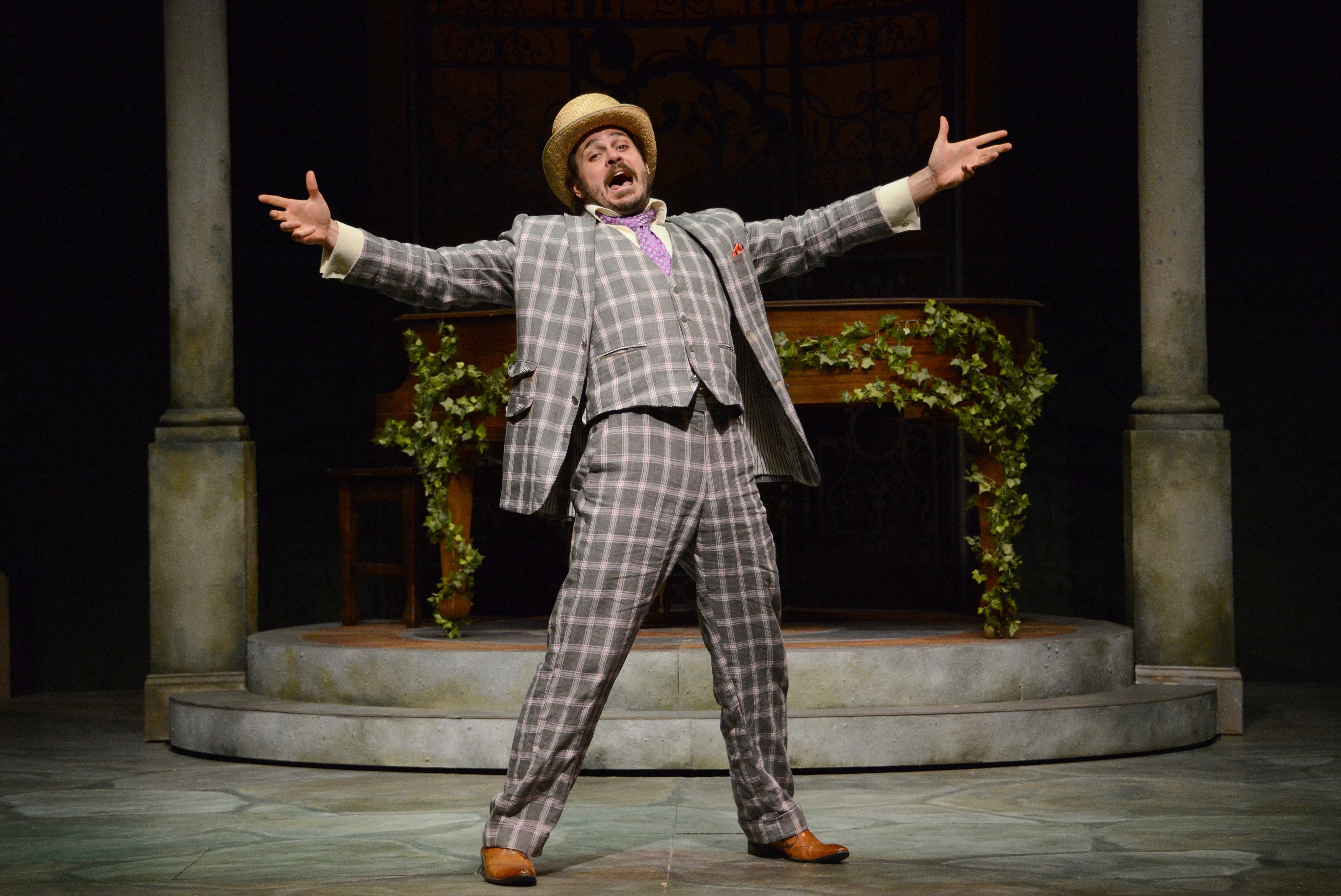
‘Foolery, sir, does walk about the orb like the sun, it shines everywhere’ — so declaims Feste the fool (Mitchell Jarvis) in ‘Twelfth Night,’ a play that’s out to prove it.
All Shakespeare comedies were not created equal. Some are seriocomic, some are silly, and some are very silly. Pittsburgh Public Theater’s production of Twelfth Night is very silly Shakespeare done very well.
The penis jokes implicit in the text are brought out with goofy gusto. The fool—i.e. the official, professional fool in the play—is very merry and quite contrary, while other characters add further dimensions of foolishness: there’s a pompous fool, a drunken fool, and more.
The Public’s choice to give Twelfth Night an early-1900s setting is a good one. The costumes, music, and mannerisms evoke a time that feels old-timey but not distant. In the actors’ physical comedy, the absurd posturing and wacky, kinetic movement are similar to the stuff in old silent films. Song-and-dance numbers are done to a tinkling piano; they have a vaudeville vibe.
Does any of this resemble how the play was performed in Shakespeare’s time? Hard to tell. Scholars differ as to what Elizabethan acting might’ve looked like, and nobody has videos. We know more, however, about how those times shaped the writing and content.
A Play for Sinners Who Sin Sinfully
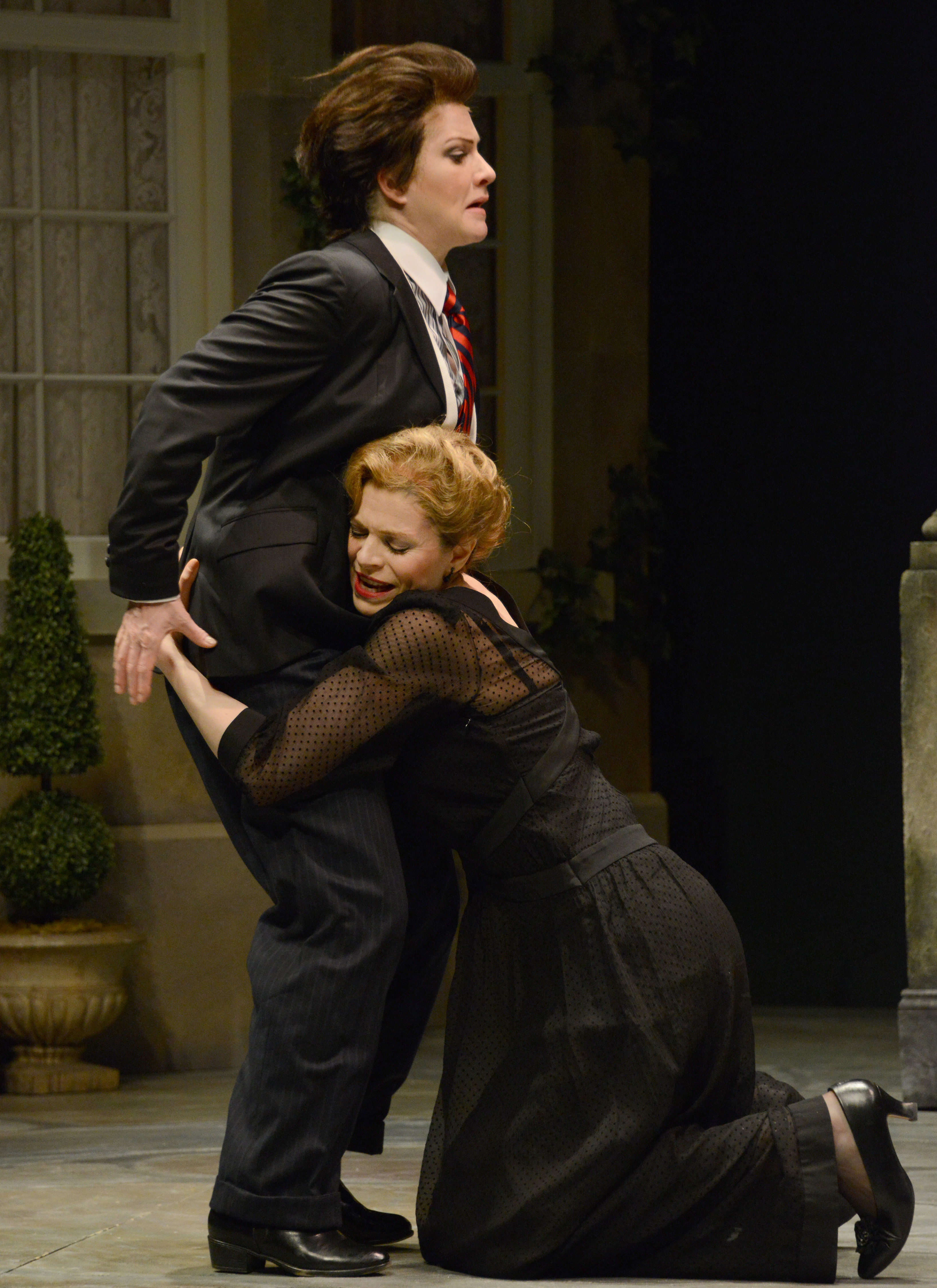
Olivia (Gretchen Egolf, kneeling) thinks she’s found the man of her dreams but Viola (Carly Street) knows the lady is barking up the wrong gender.
Twelfth Night is so titled because it was written as an entertainment for the holiday that capped the Christmas season. And to many people in England circa 1600, the reason for the season was to go wild. It had become a sort of midwinter Mardi Gras with the lid lifted, a sustained orgy of drinking, partying, and, well, orgy-ing. An Anglican bishop ruefully wrote: “Men dishonour Christ more in the twelve days of Christmas than in all the twelve months besides.”
According to another source, one custom involved “a changing of clothes between men and women; who when dressed in each other’s habits, go from one neighbor’s house to another … and make merry with them in disguise.” The Puritans loathed the Christmas celebration. The amoral majority loved it so much they extended it. Although much of the sinning was front-loaded into the traditional 12 days, festivities ran for the Biblical span of 40 days and nights, all the way to Candlemas on February 2.
That date in 1602 marked the first recorded performance of Twelfth Night. Exactly 415 years later, on Candlemas in 2017, The Public allowed critics from the scurrilous media to join the crowd viewing the play here.
Enter, with Thunderclaps, into the Jolly Jumble
This production opens with a bang. The lights go down and the pitch-dark theater is rocked by the sounds of ferocious thunderclaps, howling winds, and muffled shouts and cries. As we’ll soon learn, a ship at sea is being hammered to pieces, and starting off this way serves a double purpose. It conveys the feeling of a shipwreck while also “transporting” the audience. The plunge into a blackness full of rumble and clatter is like the dark entrance tunnel of an amusement-park ride—the part that yanks you out of everyday reality, letting you know that topsy is about to be turned turvy.
When the stage lights come up they reveal our heroine, fair Viola (played by Carly Street), cast safely ashore. The ship’s captain (Tony Bingham, who plays a second role later) has survived along with her. And now the play races through a lot of exposition in a hurry.
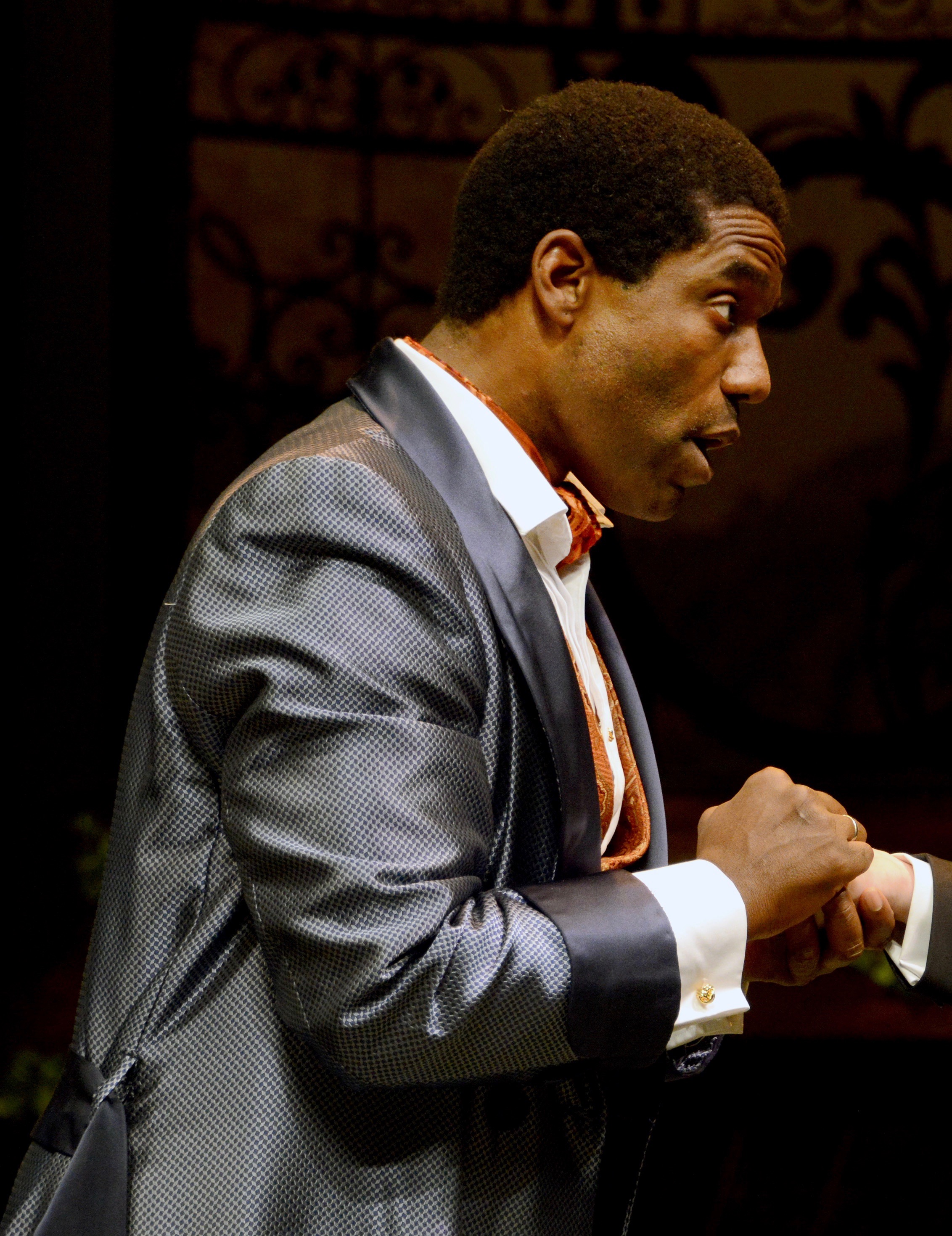
Is Duke Orsino (Timothy D. Stickney) the only one playing it straight here?
Viola fears that her twin brother, Sebastian, was lost in the wreck. Take heart, says the captain, for he saw the young fellow nimbly keep himself afloat—and sure enough, Sebastian (Max Rosenak) will show up eventually. Meanwhile, Viola learns that she’s landed in a fair country ruled by a noble duke, whereupon she quickly hatches a plan for getting by. She will dress in men’s garments and offer her services at the duke’s court.
So here comes the Christmas cross-dressing theme, to be mixed with the standard comic device of mistaken-identity twins. Twelfth Night then piles on the comical complications in a manner which comes across quite clearly while watching but can only be summarized in a humble jumble presently.
Viola, passing as a man, falls in love with Duke Orsino (Timothy D. Stickney), but alas, the duke loves an ice queen named Olivia (Gretchen Egolf)—but wait, Olivia’s cold heart melts at the sight of the man she thinks Viola is. Now we’ve got the triple trouble of a gender-confused triangle, which is further multiplied by the antics of Olivia’s drunk uncle, Sir Toby Belch (John Ahlin), who embodies the spirit of Christmas when fueled by alcoholic spirits.
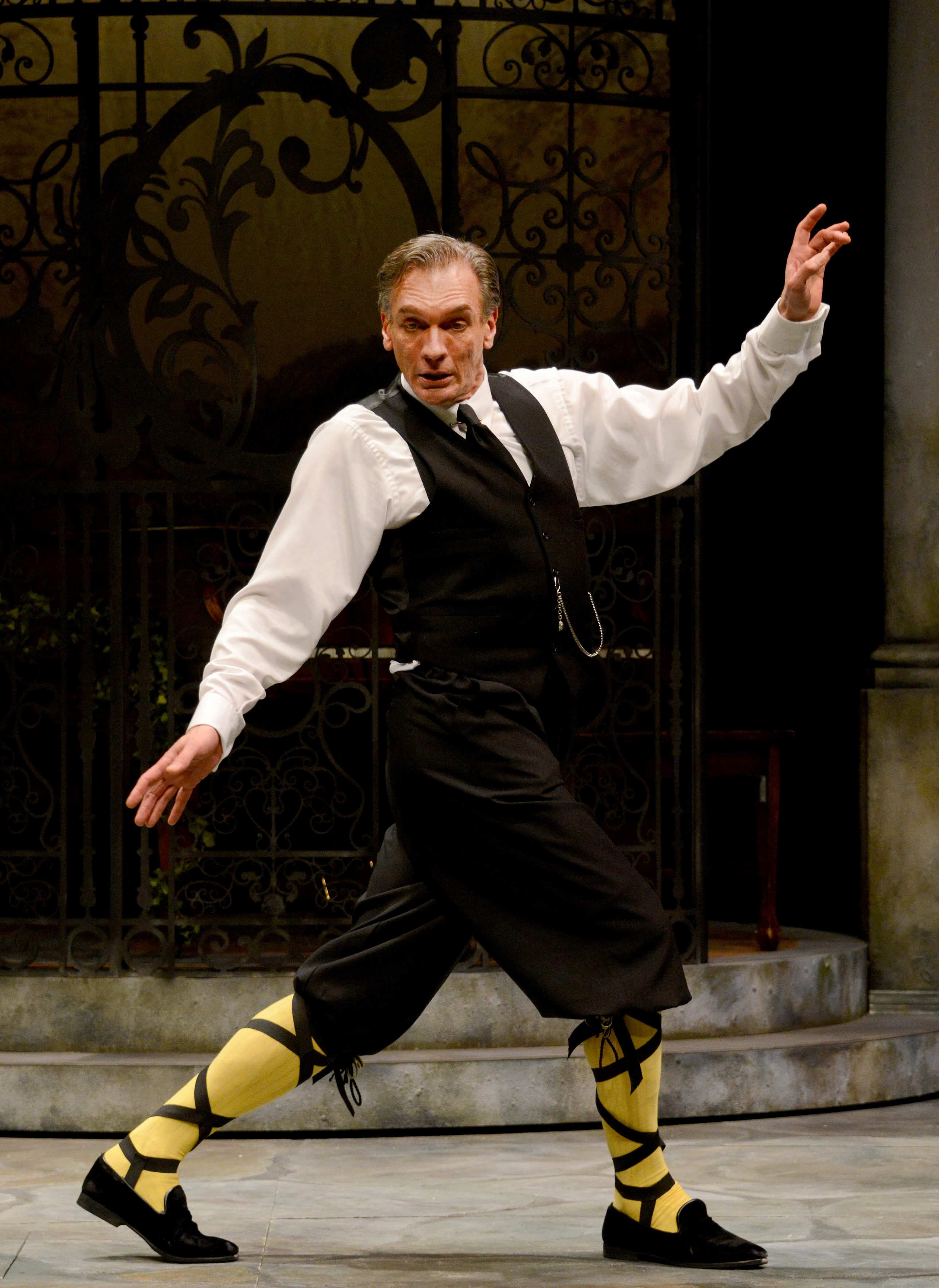
Malvolio (Brent Harris) thinks he cuts a dashing figure but he’s been tricked into dancing with the sharks.
The aptly named Belch—who also farts occasionally, repeating his message in another language so everyone can get it—conspires with a motley crew of servants (notably the maid Maria, a non-virgin mother of mischief played by Helena Ruoti), to pull a nasty prank on the prim and proper Malvolio (Brent Harris), who represents the buzzkill Puritans.
(Thus, Belch’s famous line to Malvolio: “Dost thou think, because thou art virtuous, there shall be no more cakes and ale?”)
The snappy repartee of the fool Feste (Mitchell Jarvis) spices the whole stew nicely, while Sir Andrew Aguecheek (Daniel Krell) contributes touches of utterly hapless foolishness. And when shipwrecked Sebastian finally appears, dressed and made up as the spittin’ image of his twin sister … whoa, I’d better stop here.
Play On; Don’t Barf; Exit Smiling
There’s a point at which words fail to summarize the silliness of Twelfth Night. In fact, there’s even a silly philosophical dialogue about the hypothesis that words fail—which cannot be logically proven, it turns out, since words would have to be used, and words fail.
Luckily, Twelfth Night is highly “accessible,” in the sense that Shakespeare wrote it in English still easily understood today. Otherwise we’d be drowned amid the swirl of double-dealing words and exponentially increasing tomfoolery.
Some scholars have divined deeper significance in the play, commenting for instance on the statements it may seem to make about gender identity. But a high-ranking member of The Public’s staff warned me beforehand, “Don’t try to read too much into it,” so I didn’t.
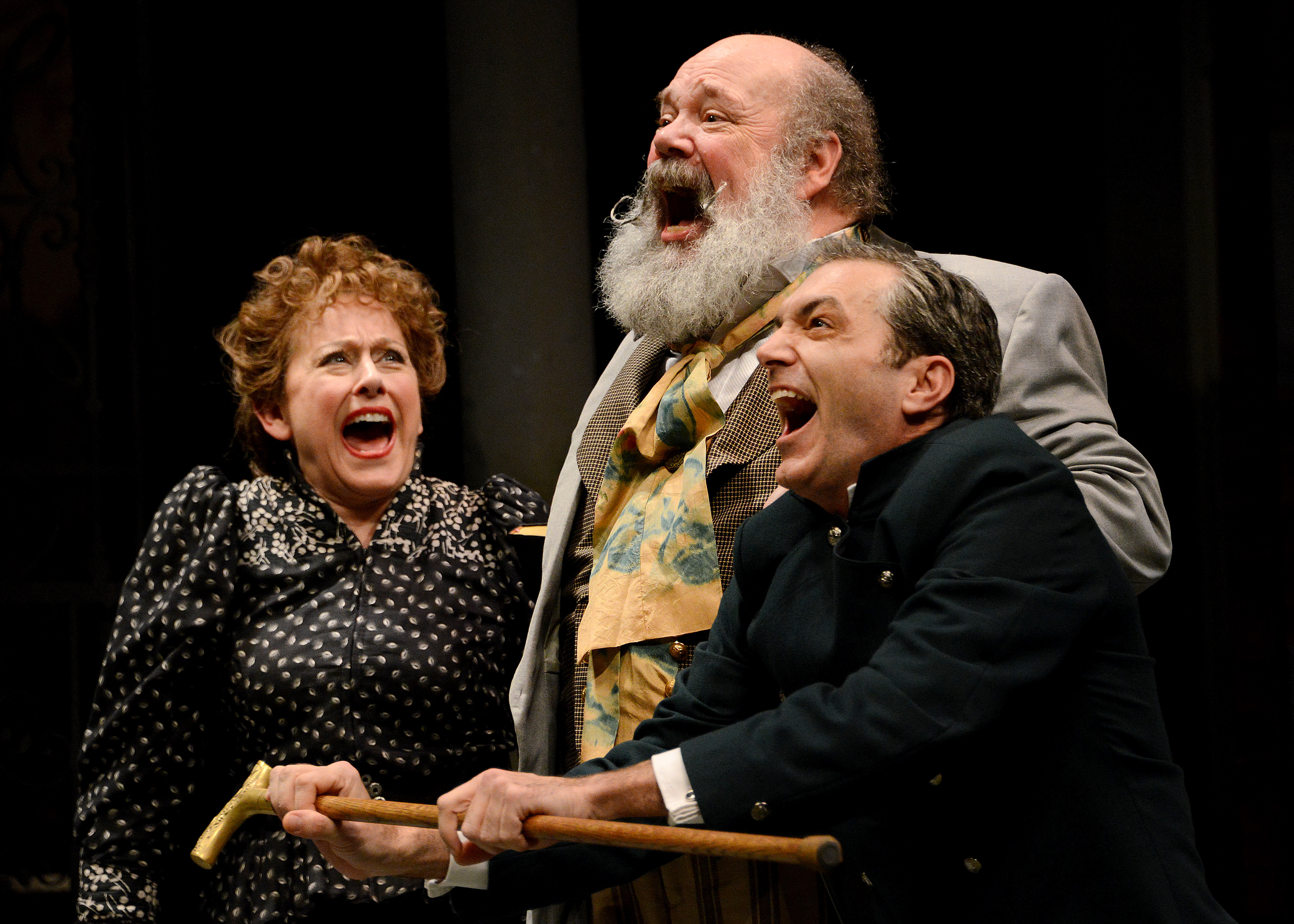
Maria, Sir Toby, and Fabian (Helena Ruoti, John Ahlin, Tony Bingham) can’t believe how silly things get, and they are expert practitioners themselves.
I would only note that some well-known quotations from Twelfth Night have different meanings within the context of the play than we normally give them. For example, when Duke Orsino says “If music be the food of love, play on,” he’s not asking to be put in the mood for romance. He is suffering from unrequited love and wants his musician to stuff him so full of sentimental schmaltz that he’ll barf and get over it.
The appeal of Twelfth Night lies in its ability to keep turning the tables and periodically upset them, which thereby keeps the chuckle-pot simmering. Maybe it’s not for everyone. At intermission I met a trio of friends leaving early; they said they got the picture and the first hour was enough for them.
But the masses returned for the rest. And the band (I mean the cast) played on, delivering a maximum daily requirement of giggles and belly laughs, and nobody barfed. Indeed the response at the end was a unanimous standing ovation.
Personally, I’d have wished the play a bit shorter, but found plenty to enjoy throughout. One test of a work of theater is the mood it creates, and I emerged from this one in a light-hearted mood—which hasn’t always lasted, but hey, that’s not Shakespeare’s fault!
Closing Credits and Ticket Info
Twelfth Night is directed for Pittsburgh Public Theater by Ted Pappas, the company’s Producing Artistic Director. Original music was composed by Michael Moricz. Actors not mentioned above are Chad Bender, Don DiGiulio, Andrew Miller, and Drew Stone.
Through Feb. 26 at the O’Reilly Theater, 621 Penn Ave., Cultural District. For show times and tickets visit The Public online or call 412-316-1600.
All photos are by Michael Henninger.
Mike Vargo, a Pittsburgh-based writer and editor, covers theater for Entertainment Central.
Share on Social Media
Follow Entertainment Central
Latest Stories
Sign up for the EC Newsletter







